Breaking into the international speaking market: going from local to global

A keynote at a corporate conference in China.
A 3-day training workshop in Brazil.
An expert panel discussion in Portugal.
Getting to jet off around the world sharing your ideas as a professional speaker is an alluring and exciting way to earn a living. You get to see different countries and make connections with completely new audiences.
Imagine travelling to 20 or 30 countries a year, sharing insight with people from many different cultures and backgrounds, connecting you to a bigger picture—your ideas flying to all four corners of the world.
Many speakers have the career goal to get booked on stages around the world, but how do you transition from speaking on your regional circuit to the world stage?

In this article, we have gleaned insights from a few global speakers like Rah Gor, Drew Dudley, Ty Bennet, and Fredrik Haren who offer advice on how they went from regional to national to international.
This article should give you a lot of ideas on how to start changing your mindset, and will provide practical pointers on how to find and get in contact with event organizers and go from a local speaker to the global stage.
1. Mindset: start thinking of yourself as a global speaker
"A passport is not a skill, it's not a competence."
—Fredrik Haren
How you start thinking about yourself and your skill-set can have a transformative effect on shifting you from a local or national stage to a global one.
A lot of speakers associate themselves with their location, but these labels are not helpful.
There's no real added value in being a Swedish speaker, or an American speaker. Instead, be crystal clear on what your topic is and what problem you solve.
Start thinking of yourself as a global speaker, even if you haven’t travelled outside of your country to speak. Fredrik Haren says that when you have this perspective shift, your mindset totally changes, not only you're speaking career. It will start changing the way you speak, the articles you choose to read, and how (and with whom) you invest your time and energy.
Level-up your mindset, and changes will start to unfold.
This is not to say that you just need to start thinking about it and it will happen. Or after one week of calling yourself an international speaker, you will get a booking in Tokyo. It probably won’t happen immediately, but expanding your perspective will help you start to notice opportunities that might have breezed by you in the past.
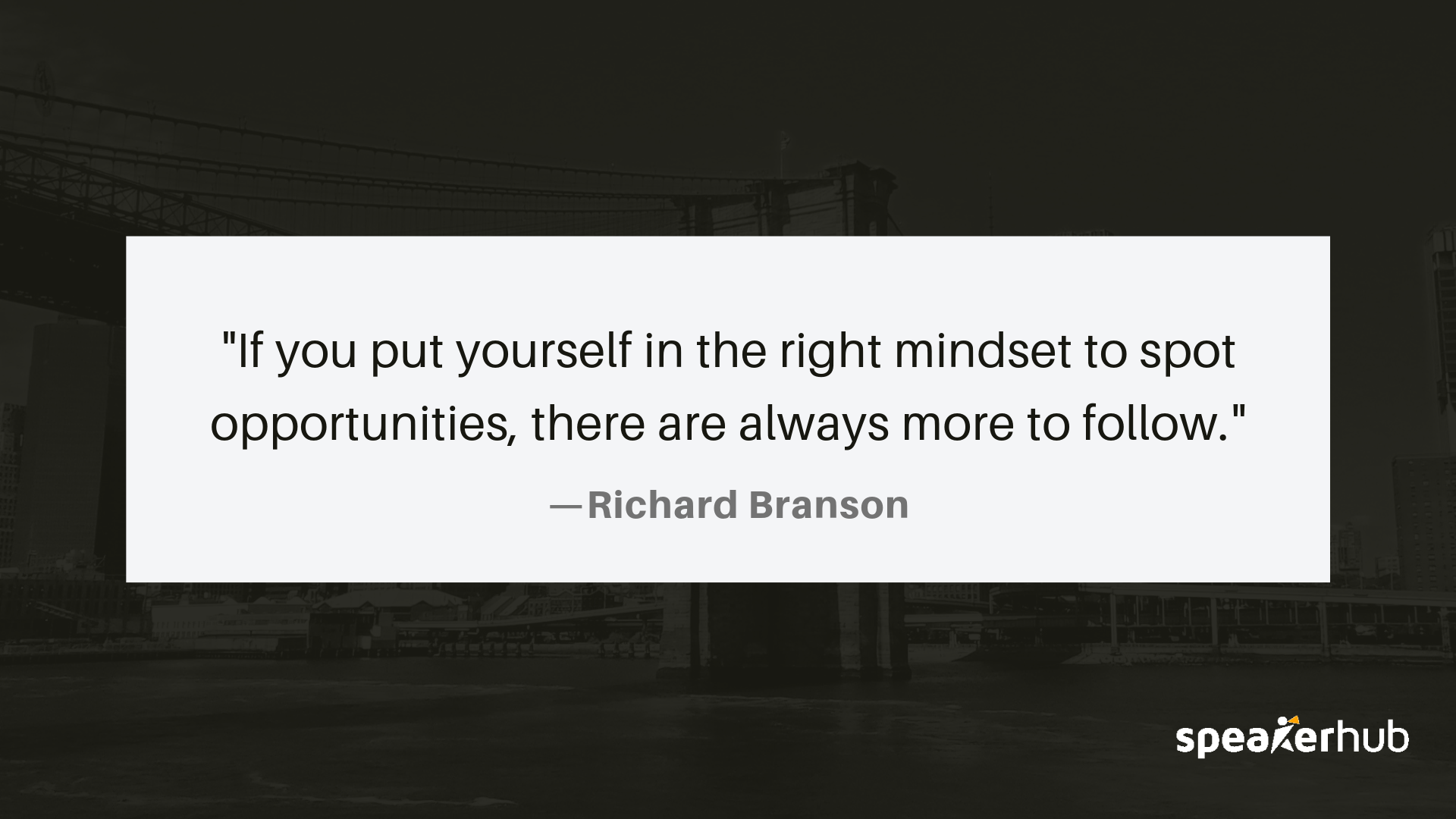
"If you put yourself in the right mindset to spot opportunities, there are always more to follow."
—Richard Branson
Once you start to notice opportunities, the key is to take advantage of them. Put yourself out there, contact event organizers, tell anyone who will listen that you are looking to get on the global stage, put in the work to create noteworthy applications.
If you have the right perspective, and then put in the time, effort and commitment, doors will start opening for you. It’s only a matter of noticing opportunities, then acting on them.
2. Develop a message that transcends
Your message has to be applicable to a wide variety of audiences, while still being targeted and niche enough that you stand apart from the million other speakers out there.

A tall order, right?
Here is the idea: you have a niche topic that is well suited for one particular group: if your topic is leadership, pinpoint whether it is going to be global leadership, executive leadership, activist leadership — whatever it may be, own it.
Then take the core of those ideas, and make it applicable to a variety of different audiences.
Before things get confusing, let's explain this with an example.
Going back to the above example, let’s say you talk about executive leadership.
The main idea of your talk as it stands is that today’s leaders need to be able to lead several generations at once. You mostly focus on the differences between Gen Z, Millennials, Gen X, and Boomers. Your talk goes through the different values of each generation, communication problems that might arise, and how to solve them.
But here is the thing—while there may be some loose connections between a teenager in Taipei and one in Tampa, or a few similarities between a 55-year old business person from Hanoi and one from Quebec City, there are probably many differences that need to be taken into account, and if you are not careful, the talk as a whole might end up missing the mark.
You need to zoom out.
Instead of looking at the characteristics of a generation in your country, focus entirely on how to help leaders lead several groups of people with diverse perspectives and values at once—concepts that could be applied not only to generational differences, but differences in culture, ethnicity, gender, education, and profession.
This will broaden your talk, making it applicable to a larger, global audience.
The more that you expand, the more that you move to a global perspective, the more your story, content and message will develop depth and value.
3. Be able to adapt your talk on a dime
Creating great experiences for each audience means being able to see each audience for who they are, and adapting your talk to meet their needs specifically.
There are a lot of speakers out there who give the same box standard talk no matter which stage they are on. Sure, they might throw a local joke into their intro, but basically, they have a rehearsed talk, and this is what they offer.
Dynamic, engaging speakers look at each new audience and try and figure out how they can best serve the people in front of them. They look at the demographics; they look at the industry; they look at the culture. They adapt their content, interactivity, and tone to suit the audience, which results in more impactful presentations.
But it takes practice.
High-level, international speakers have practiced for so long that it seems like second nature, but they had to start somewhere, and the best place to start is by asking the event organizer exactly what the audience needs, then coming up with ideas on how you can adapt your talk to meet those needs.
If you are presenting to an audience from a different culture, learn as much as you can about it.
Talk with locals from that culture, from the industry. Notice the language style and the tone they use, and see if and where you can match it in your talk.
Do a bit of research and make sure you know what the faux-pas are before you get on stage. Find out about their sense of humour, their communication style, and what gestures or language are inappropriate, before you even arrive.
For example, a joke that may work perfectly well in Poland may be culturally offensive in Japan.
While in America, encouraging your audience to stand up, jump around and cheer might get the audience excited and invigorated. In England, this might turn the audience off.
Will religion be a factor? While kissing to the event organizer on the cheek after they introduce you might be perfectly acceptable in North-Western Europe, in the Middle East it could cause an uproar—even legal issues.
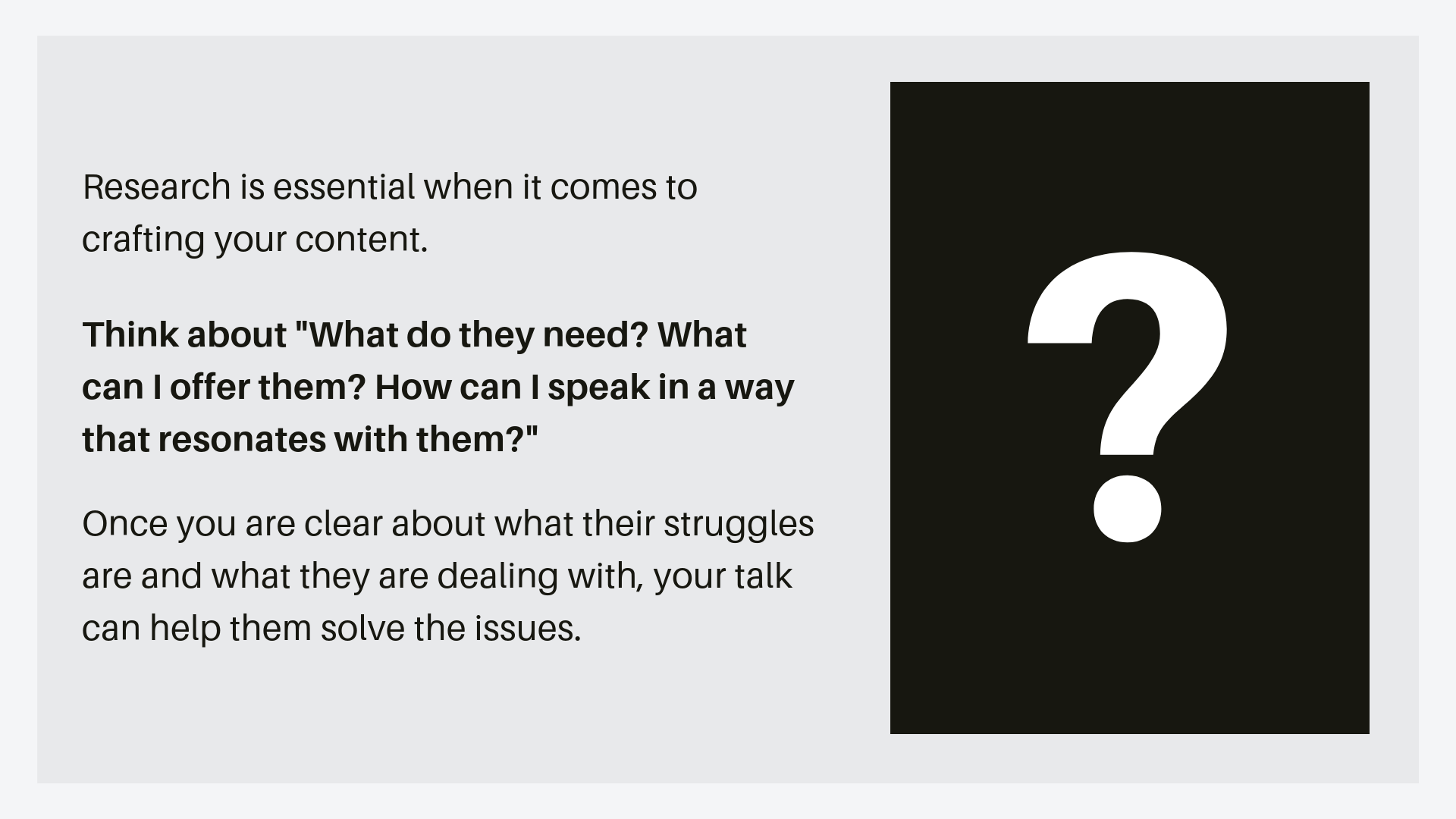
What are the words that that audience would use? What are the conversations they're having?
Research is essential when it comes to crafting your content.
Think about "What do they need? What can I offer them? How can I speak in a way that resonates with them?"
Once you are clear about what their struggles are and what they are dealing with, your talk can help them solve the issues.
Read more about adapting your talk:
-
Knowing your audience: the key to adapting your presentation
-
World of Speakers E.47: Creating value and connections with your talks
4. Create a clear and convincing marketing package
In some regards, today’s event organizers have it easier—there are so many ways to vet a speaker that weren’t available 30 years ago.
With the rise of search engines and social media, all the event organizer needs is your name.
They can perform a search and find out a lot about you, easily. They can watch a video and see what you look and sound like on stage. They can judge whether you as a speaker have influence, based on how large and active your social media following is. They can see your style, and make assumptions about your personality by what you post. If they like what they see, they will be well on their way to hiring you before they even talk to you.
However, this means that your online marketing materials are essential in helping you get booked. The materials should present the appropriate information to convince the event organizer you are a credible expert on your subject.
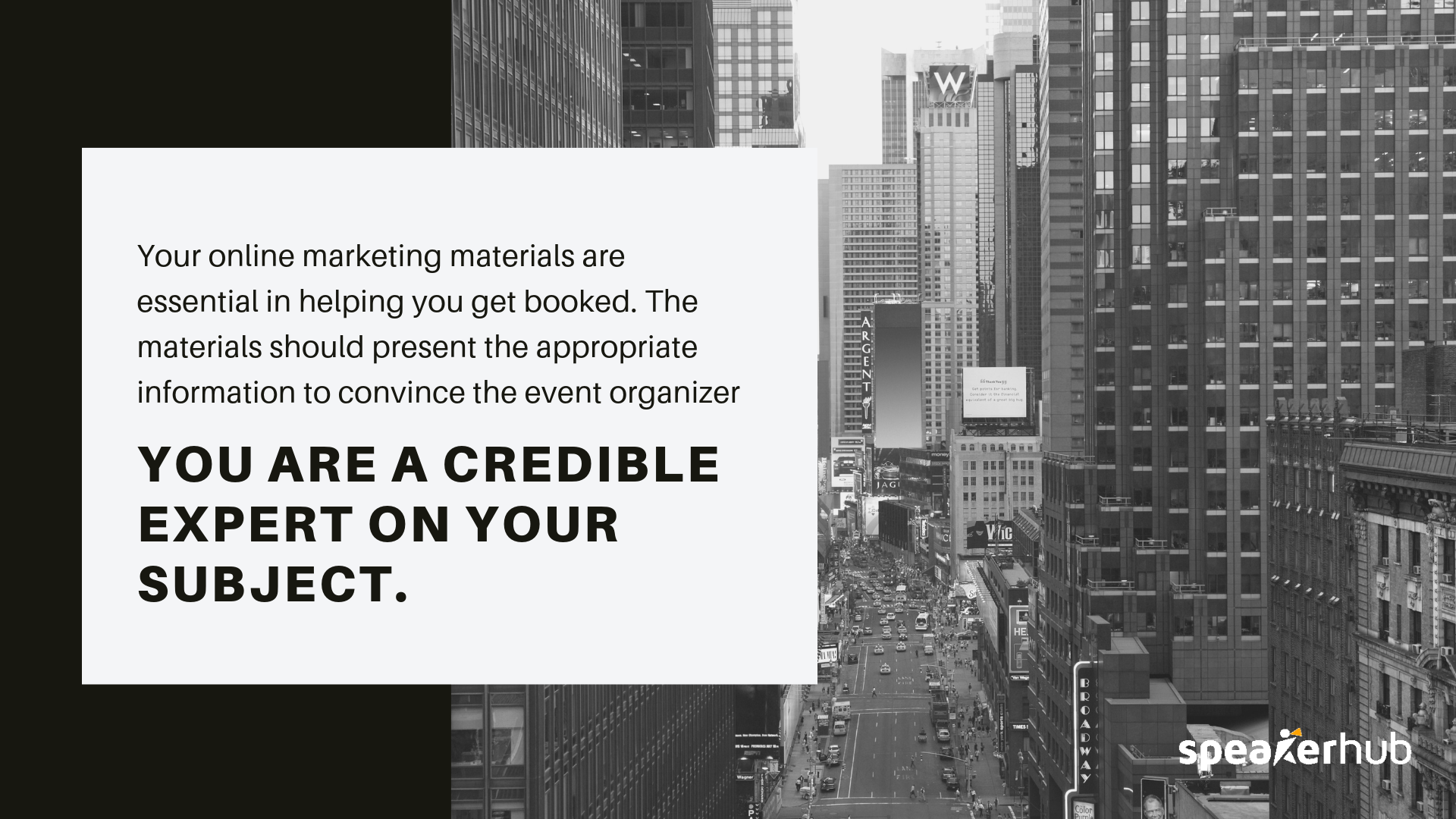
Shortlist of marketing materials you will need to make an impact online:
Once you have all these created and ready to go, condense it to one simple and effective package that you can send to potential event organizers. The idea is to give them a compact and comprehensive idea of who you are as a speaker.
Make sure each element is strong, clear, and professional. It doesn’t have to be fancy—but it does need to hit home that you are competent and credible.
Remember to keep it simple and effective.
5. Start building a solid local base
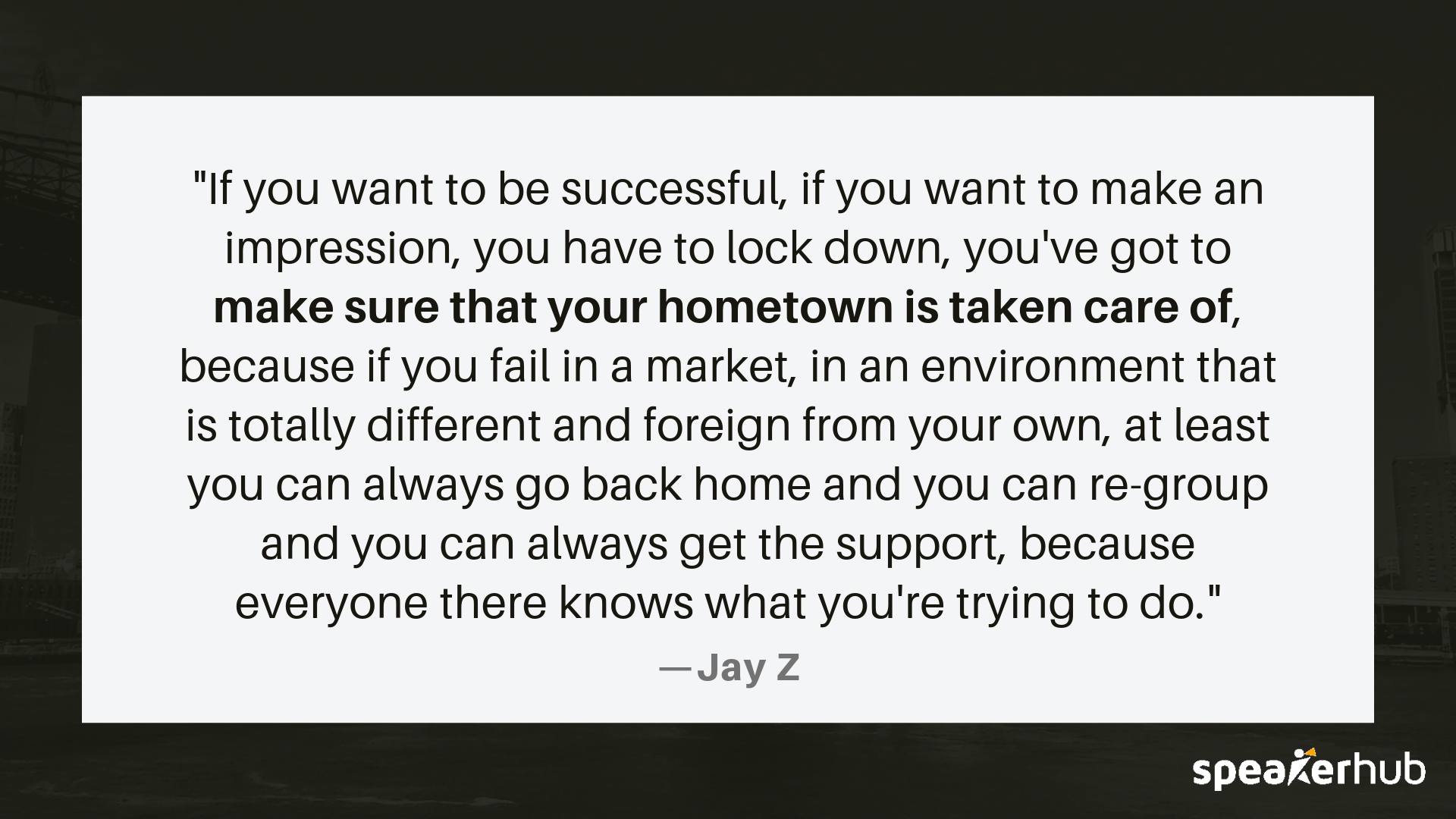
"If you want to be successful, if you want to make an impression, you have to lock down, you’ve got to make sure that your hometown is taken care of, because if you fail in a market, in an environment that is totally different and foreign from your own, at least you can always go back home and you can re-group and you can always get the support, because everyone there knows what you're trying to do."
—Jay Z
Before you set your eyes on the horizon, you need to lock down your local market.
You’ll want to create a home base, then make sure that home base is always taken care of.
Invest time and get active in local organizations. Go to events and network with other speakers in your city and industry. Build a loyal audience who you reach out to regularly and who know, trust, and like you.
This can help you in a multitude of ways.
Imagine this situation: there are two speakers, Amy and Dan, who have been speaking professionally for under a year. They both have a goal of speaking more internationally, specifically, developing an audience in Asia.
Amy has a solid fan base from her hometown, Toronto. She has spent a lot of time working with local NGOs, often offering talks pro-bono, and this has opened up some opportunities to work with different companies on their leadership models. Amy is active in her local Toastmasters chapter. She writes a blog and regularly guest posts on some of the local NGO blogs as well.
Dan is running 2-3 smaller projects while he is growing his speaking business out of New Jersey, and has not had time to develop a local base. While he knows a handful of people from the industry, he has mainly been focused on getting booked in some of the neighbouring states, jumping around between New York City, Washington, and Boston, taking bookings wherever he can.
Let’s say that there is an event organizer who is looking at both of their applications. He jumps online and can see that Amy has a lot of interaction on her social media, that she is writing consistently about her topic, and that people seem engaged with her content. Dan hasn’t really invested time in developing a presence online, and although he occasionally jumps on social media to post about events he will be speaking at, his posts don’t get many interactions. What do you think this says to the event organizer?
When you have a local, active fan base, it shows that you are credible and that audiences care about your ideas and insights.
A home-base can also provide support when it is crucially needed.
Say it doesn’t work out for either Amy or Dan in Asia. When they come home, they might feel defeated, and question whether speaking is really for them.
Amy goes to her local Toastmasters meetup, and there she is encouraged by other speakers. This helps her see the bigger, long-term picture.
Dan, on the other hand, goes home and seriously contemplates throwing in the towel, because he doesn’t have the support network he needs at the moment to feel encouraged and inspired.
It can make a substantial difference long-term.
6. Work with the local chapters of international organizations then maximize the 6° of separation
When you are looking for local organizations and companies to get involved with, look for those that have a global network.
Rah Gor has organized world tours using this model. He finds an international organization, gets his foot in the door with the local chapter, then uses that to get booked around the world.
Here is his advice:
“See if there are any international organizations that are connected within your country.
Say it's the US, and you see that same organization has chapters in other countries.
You can find one organization that has twenty chapters in twenty different countries, there are a lot of opportunities there.
Start with the local organization and figure out what the lay of the land is: what the culture is like and how to adapt your content to best suit them.”
Fredrik Haren shared with us an idea based on the 6° of separation (that all the people around the world are six, or fewer, social connections away from each other), and how to use a talk with a small, local organization to launch you internationally.
Here is the example Fredrik offered:
“Let's say there's a conference for SAT teachers and you’re invited to speak about the value of creativity in education for SAT teachers in Grand Forks, North Dakota.
How can you use that to get onto the global stage?
The first thing: always do a great speech.
The client absolutely loved your talk, and afterwards, she comes up and says, "That was amazing. I want to introduce you to Debra, she is in charge of the mid-Western Conference of SAT teachers."
Debra says, "I would love for you to come to Minnesota and do this, we have people from 25 different states here.”
And so she books you.
Now, you do that speech, and in the audience, there is a woman who runs the American SAT convention. She comes up to you after your talk and says:
"Your talk made some great points and you are an excellent speaker. We have to have you at the American SAT Conference next year."
They book you for the American SAT Conference, and while you are there, you meet a man from China named Li. Li runs a company which teaches Chinese students how to do well on the SATs and he says,
"I have 10K Chinese students that I am bringing to a huge stadium to teach them how to excel at the SATs. One of the aims of our conference is to teach the students how to cultivate creativity. Would you be able to talk to them?"
So four connections away from speaking for 10K Chinese students in this stadium after you spoke to 250 teachers in Grand Forks, North Dakota
This happens all the time for professional speakers, but you have to look for the opportunities.”
What stands out in this example is that there are no stages too small.
While you might be hyper-focused on applying to international conferences and events, you can use events closer to home to start making global connections.
While in Fredrik’s example a lot of the event organizers referred or approached the speaker directly, the point he is making is that local events can expose global opportunities. So don’t be too quick to turn down smaller, local events because they aren’t on the international stage.
7. Dig where there are potatoes
I remember once, years ago, I went to a sales conference and a dynamic speaker got on stage and offered us a talk on how to increase our sales.
Admittedly, I have forgotten almost everything else from the talk, with the exception of this one line:
“Dig where there are potatoes”.
It has stuck with me for years because it is simple and logical: Go where the opportunities are.
Don’t pull out all the stops to try and find bookings where the market is oversaturated, or there isn’t a large enough need for speakers on your topic.
As a very straightforward example, the main TED Conference is a saturated market. A million speakers are trying to get there, meaning it is going to be a challenge to stand out, get noticed, and get booked.
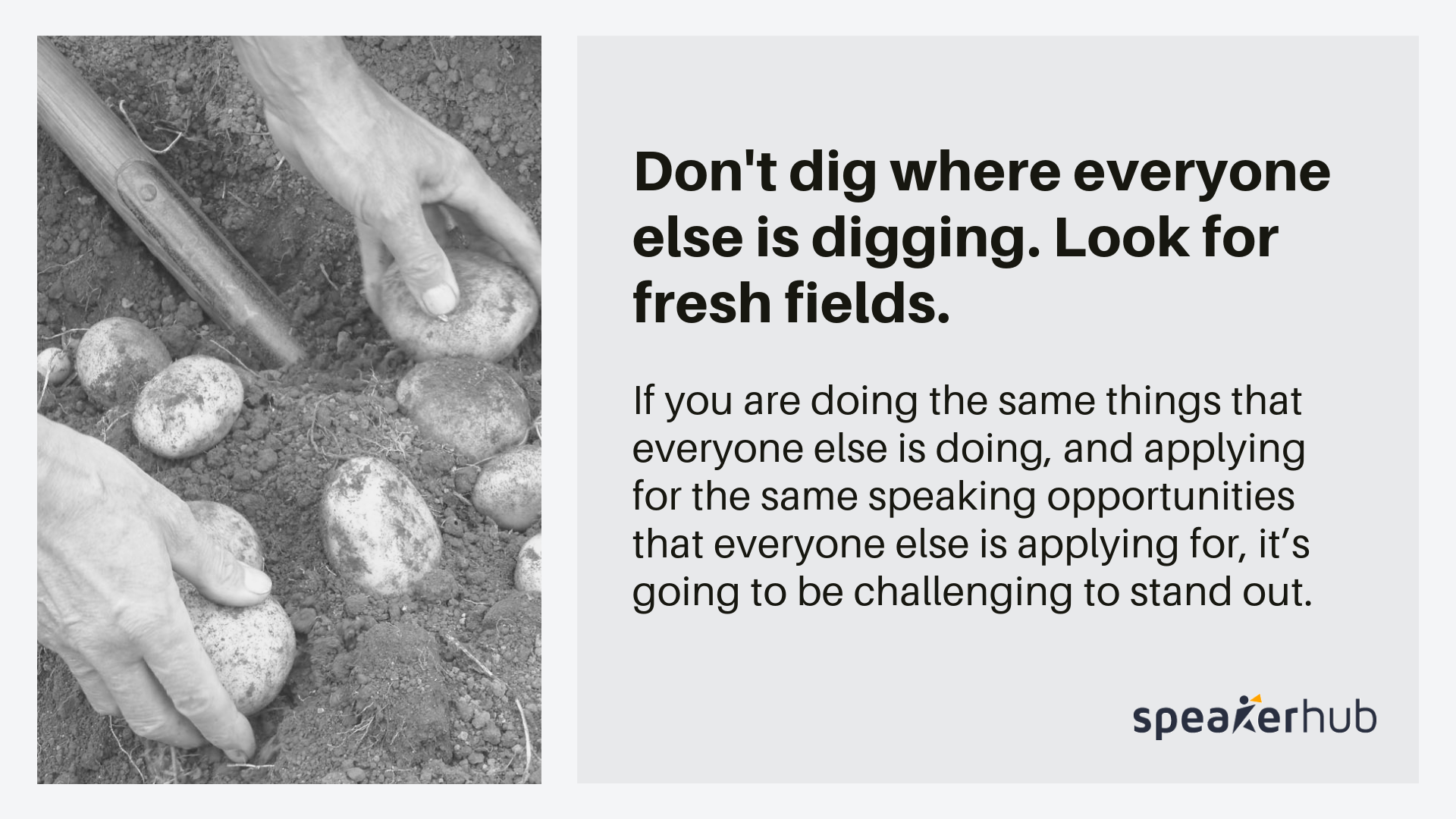
While getting on that stage will undoubtedly help your credibility and project your name out there, you have to consider if trying to get booked by TED is the best use of your time, or if there are more profitable places to look for new bookings.
Below, Fredrik Haren outlines an excellent example of how there are hundreds of thousands of conferences happening every year as the global market for public speakers is changing, and where to start looking.
“When I came to Asia, I used to speak at conferences and there would be 12 different languages. There would be 25 translators and they would translate into 12 different languages in the back of the room—it would be Korean, Japanese, Thai, Indonesian, Malaysian, and so on.
So why have an Asian Management Conference when in the break, they can't even talk to each other?
But now the level of English in Asia has, especially for people working in global companies, international companies, increased so much that this is now possible.
When I spoke at the first-ever Asia Management Conference, it was 5K people in the Marina Bay Sands in Singapore.
From a conference that didn't exist to a conference of 5K people, because suddenly they realized these people need to meet. That happens over and over and over and over.
Asia is 60% of the world's population, so if 60% of the world population now also starts to have big conferences in big convention places like Phuket, Taiwan and Bangkok, that's a huge amount of new speaking opportunities opening up.
There might be 20K, 30K, 50K speakers out there, but there are hundreds of thousands of conferences happening around the world.
It's essential to have a total abundance mindset when it comes to this.”
If you are doing the same things that everyone else is doing, and applying for the same speaking opportunities that everyone else is applying for, it’s going to be challenging to stand out.
Start digging where there are potatoes—where the market is less saturated and there are more opportunities.
8. Invest time in researching
What are the twenty countries you want to go to? Name them.
What kind of stages do you want to speak on? Name them.
Which organizations? Name them.
Who are the individuals who are leading those particular conferences and events? Name them.
What are their contact details? Name them.
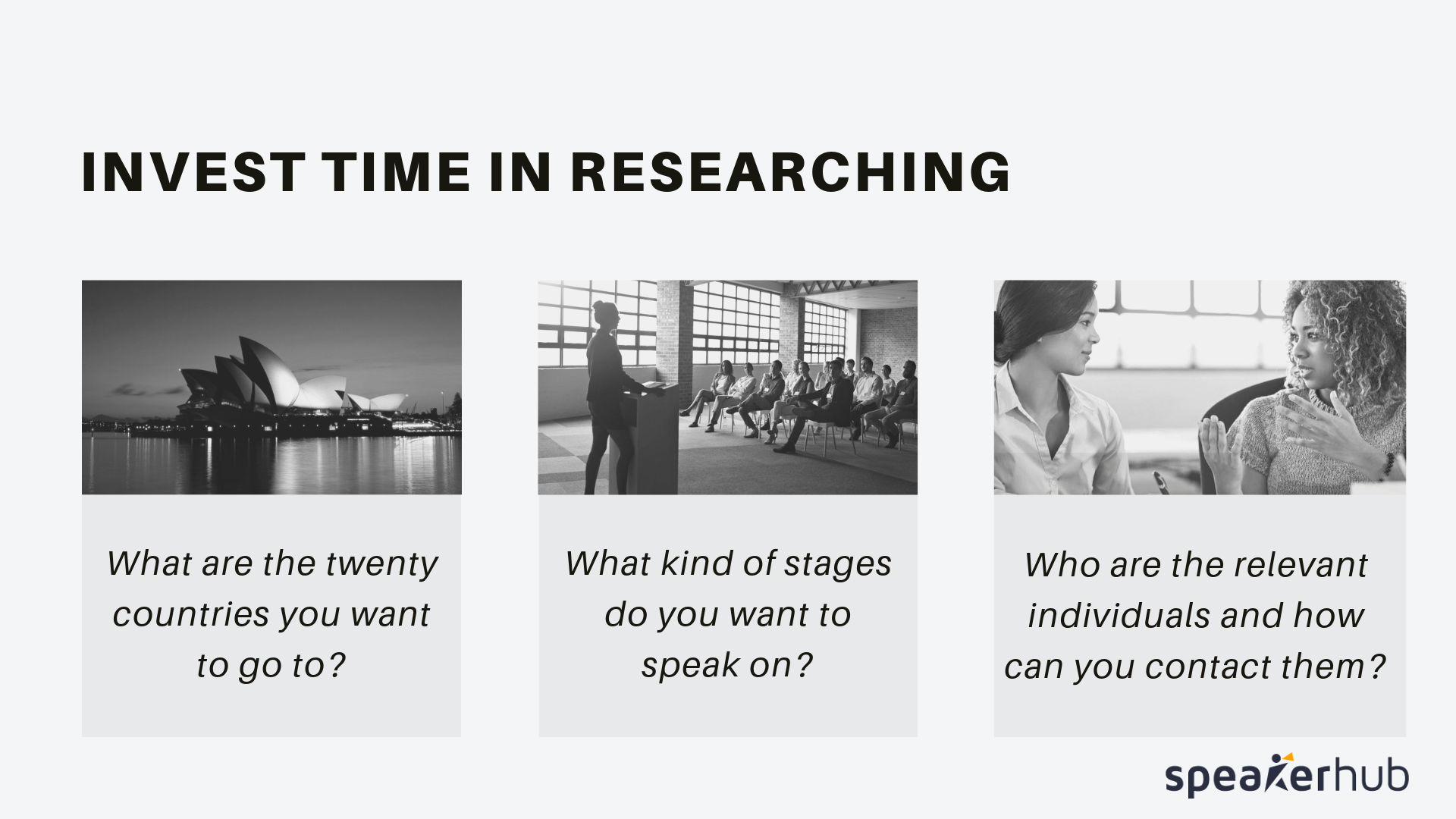
It’s not dumb luck getting booked on international stages. You have to do the work, and it's all about the details.
Rah Gor goes on world tours with his talks. He spends weeks on the road, travelling from continent to continent sharing his ideas—but it doesn’t always come easy.
He and his team put in weeks, even months, of work beforehand, researching and reaching out to companies and organizations all around the world to see what opportunities are available.
He starts by picking a country he wants to go to. Then he launches into researching. He finds the people, the organizations, and the events then gets referrals or pitches himself direct once he has done the research and has all the information.
Rah starts by finding individuals who might be interested in his ideas and connecting with them through social media. After a conversation has been started, he sets up a Skype meeting.
He uses these Skype meetings to ask them if there are specific organizations that aren't really present on social media or online, but are dynamic and would potentially be interested in working with him.
From there, he asks for referrals and then researches the organizations. If they are a good fit, he gets in contact.
It starts there; it's really that simple.
It may take time, but when it starts working, it can render unbelievable results.
Rah Gor told us a story about how research was the root of one of his biggest world speaking tours.
“Two years ago was one of my biggest years of traveling, and the majority of it was because we researched for two months for the holiday season, November and December.
It's all about the research.
Know exactly what your topic is, then find the organizations, companies, universities, colleges, schools, and NGOs that are within that field.
You’ve got to know who your audience is: what's the age, demographic, what's the topic they are interested in. When you find groups that match your core audience, reach out to them directly.”
You have to take the time to figure out who is going to be interested in your message, then look for the groups that service that audience. And to find these audiences, the research stage is essential.
9. Sell your talk
Remember: this is a business. Sell your talk as a service.
Be clear about what you're providing, your ideas, skills, and ability to make an impact.
The event organizer’s reputation is on the line. They have expectations from their organization and audience to ensure that whoever they put on stage is going to have a positive impact. If they hire a terrible speaker, they lose credibility.
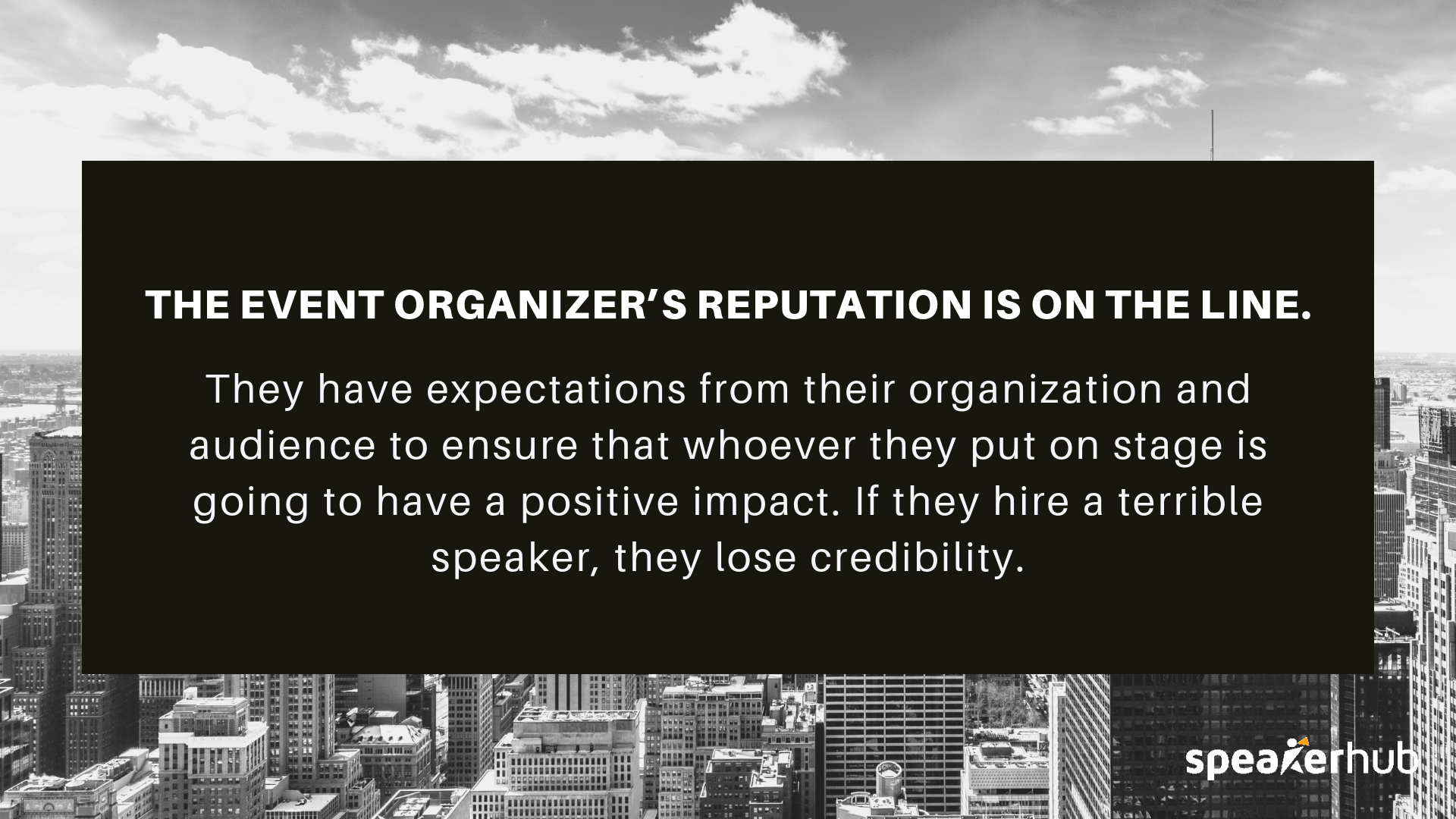
They have to be able to say: "We gave this person an hour so that our people will be better at XYZ".
If you can articulate specifically what that audience will be better at when you're done, it's going to be much easier to get more international bookings.
Drew Dudley, a fascinating speaker whose viral TED Talk has been voted “one of the 15 most inspirational TED talks of all time”, shared with us some ideas on how he sells his talk to event organizers.
“We want to be motivational, inspiring, and we want to move people. That's why we want to be speakers. But in order to get that opportunity to move audiences, you first have to sell the impact of your talk to an event organizer.
Here is an example: I talk about personal leadership values.
If an event organizer says to me:
"Okay Drew, why on earth should I give my people an hour with you?"
I would say:
“Because research shows that individual value clarity is tied to employee engagement, happiness, pride, and productivity.
If I teach people how to identify their core values and live them every day, the research shows that people who do that make better employees.
One of the untapped resources in your organization is that you probably have not put into place a process that allows people to identify their personal values and lift them through your work.
People are going to walk out of that room with a step-by-step process on how to do just that. That's going to benefit you as an organization."
When you talk directly to their needs as an organization, you take out the guesswork for them. It instills confidence by assuring them you understand what they are looking for, and will deliver the results they need.
10. Deliver a talk that an international audience will understand
You’ve done the research. You’ve made some interesting contacts, and you’ve been booked to speak abroad. If it is your first time presenting in another country, there are a few things you have to keep in mind when it comes to cultural differences.
While there is usually a lot of grace around making cultural faux-pas’, if you’d like to come off as a professional (and get booked again,) it is worthwhile to adapt and polish your talk and make sure your presentation style is appropriate for the audience.
1. Speaking to non-native English speakers
If you are presenting to an international, multicultural audience, the majority of those in the room are probably not native English speakers.
It might seem counterintuitive, but native English speakers are often the worst when it comes to presenting in English to international audiences.
80% of Americans and 66% of British people are monolingual. The majority have never experienced listening to a talk outside of their mother tongue, and how challenging it can be. Non-native English speakers are often the best speakers when it comes to presenting to multilingual audiences because they are more likely to understand what it’s like to listen to a talk in a second language.
This being said, there are many ways you can adapt your language so that it is more easily understood by a non-native English speaking audience:
-
Speak slower
-
Speak clearly
-
Simplify your language
-
Cut out slang, jargon, and metaphors
-
Watch your body language
-
Understand cultural nuances
-
Use local terminology correctly
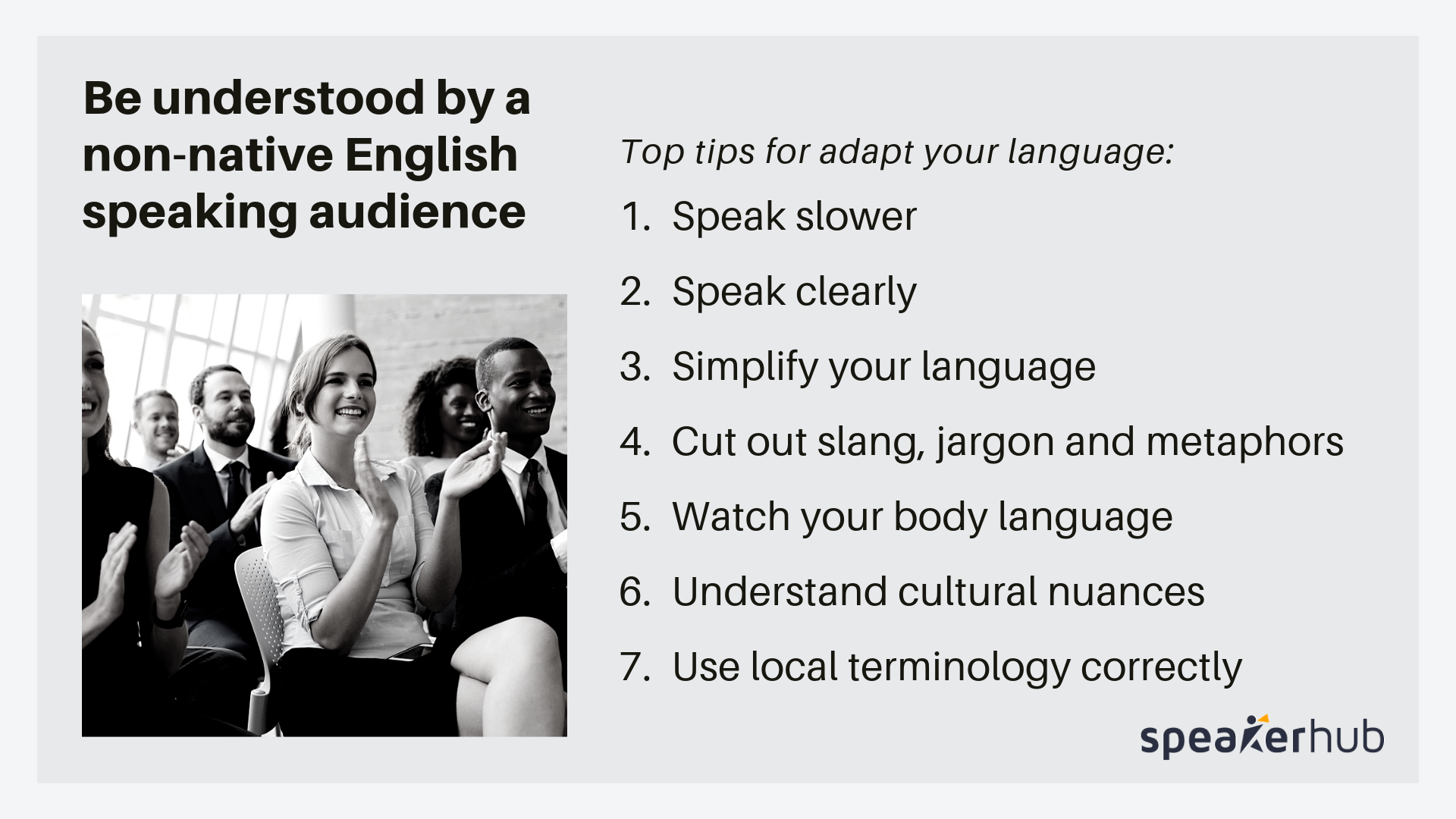
Explore this topic further: Be understood by international audiences
2. Using humor on the international stage
Used skillfully, humor can help establish an instant rapport with your audience.
It can help drive home key points or messages, and information relayed with humor is more likely to be remembered.
It can increase interest in what you're saying and help to keep your audience's attention throughout your presentation.
It lets your audience see your human side.
But be careful. Humor can also confuse, befuddle, or even offend your audience, especially while presenting to people from a different culture.
3 tips for telling jokes in other cultures:
-
Avoid making comparisons between the country you are in and other countries.
-
Even if people in the culture are self-deprecating, this is not an invitation to join in. Most people can laugh at themselves, but feel quite different when someone is laughing at them.
-
Run your jokes past the event organizer or a counterpart from that culture, as what may seem hilarious to you could be seen as confusing at best, and at worst, insulting.
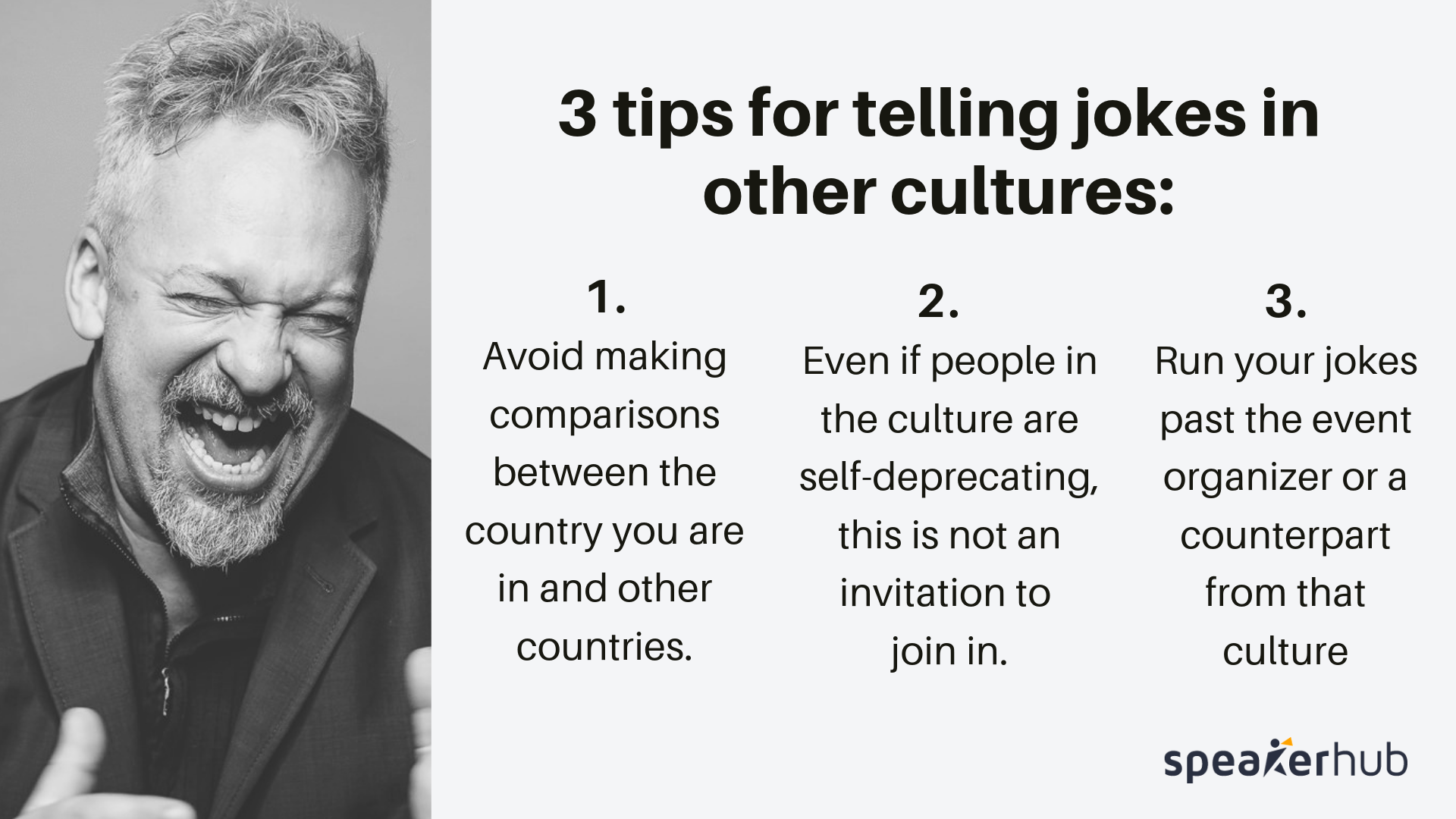
Explore this topic further:
3. International body language faux pas
Body language is a huge part of how your audience will instantly perceive you on stage, and while some body language is universal—like proper posture, and facing your body towards your audience—there are some gestures, facial expressions, and body language that can have very different meanings in different cultures.
3 examples of body language that could be misinterpreted
-
While eye contact is considered excellent body language in the West, direct eye contact can be regarded as rude in many Asian countries and in some regions in Africa.
-
Nodding your head in most parts of the world means “yes” or agreement, but it can actually mean “no” in some parts of Greece, Bulgaria, and Turkey.
-
The “ok” hand symbol can imply something is worthless in France (zero) and could even cause offense in countries like Brazil.

There is not a universal body language when it comes to gestures, so it is better to double-check before getting on stage.
Explore this topic further:
4. Working with experts
If you’re presenting to a multicultural crowd, run your presentation by a professional from that culture as a safety check. Just to ensure that your language, jokes, and gestures are going to be appropriate for that culture.
Depending on the audience, sometimes you may have to work with translators or interpreters. They can be a tremendous asset and help you create talks that are spot-on for the local culture you are presenting to.
Interpreters are not just people who speak more than one language—they’re language experts.
They have a deeper understanding of the inner-working of language and have studied how to take ideas and transfer them in a way that people of another language can understand.
Their professionalism and experience make interpreters more effective than people who just know a few languages.
Here are 3 tips for working with interpreters
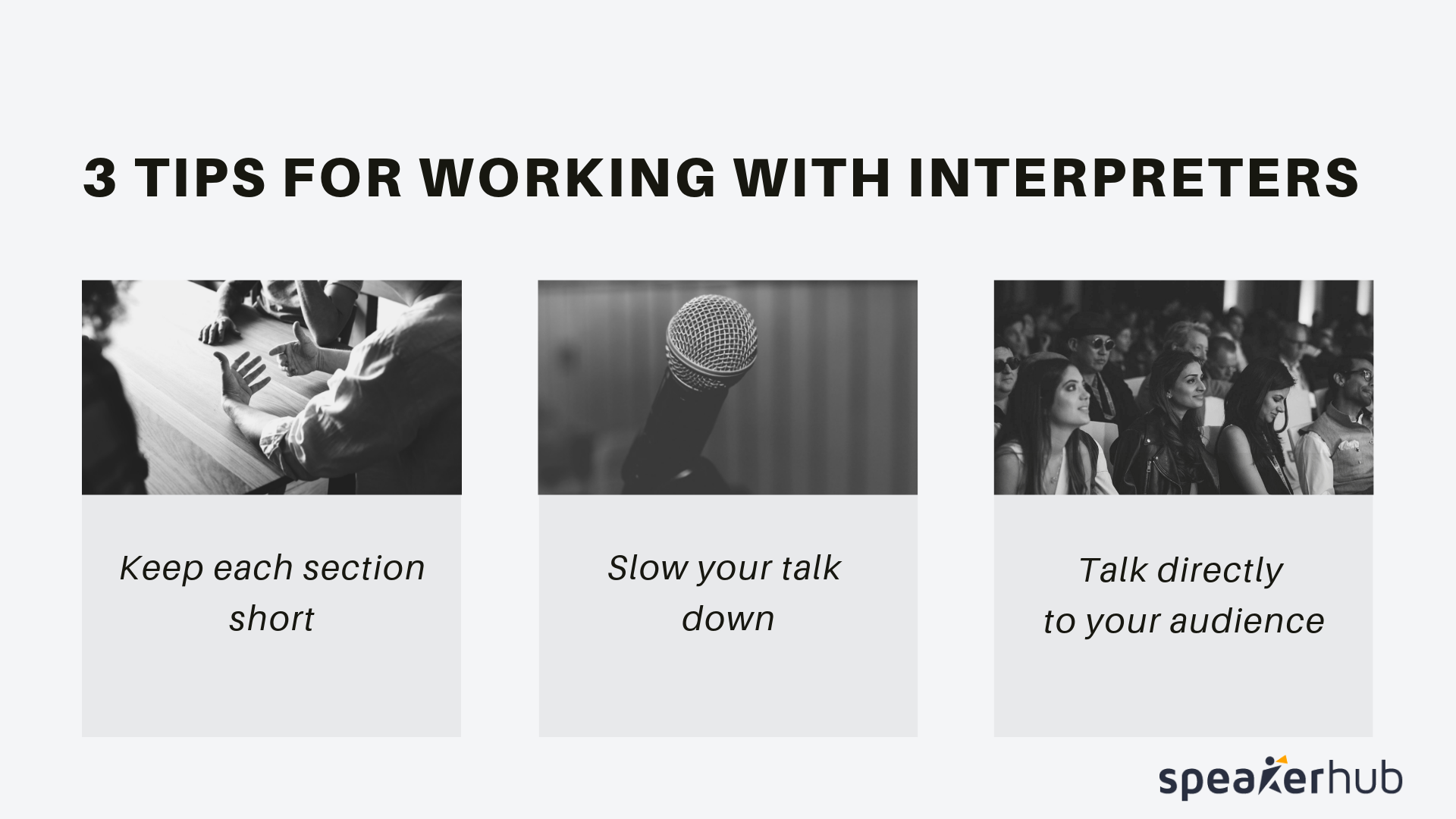
-
Keep each section short
Make sure that you are listening and watching as you are speaking. Are your sections too long? If you are speaking for too long before the interpreter can translate, the audience might get distracted or bored and the sections might contain too much information for the interpreter to remember.
-
Slow down
Speaking too fast puts a lot of pressure on your interpreter, and you run the risk that they might start skipping information just to keep up with you. While you still want to sound natural, try slowing down your pace when working with an interpreter to ensure they can relay your talk as accurately as possible.
-
Talk to your audience
Great interpreters are invisible—you are talking through them, not to them. So speak directly to your audience, instead of asking the interpreter to say things for you. The talk should be fluid and natural, as though the interpreter wasn’t there at all.
Explore this topic further:
11. Repeat bookings and referrals

"Here's the truth, long-term, for this to work: you have to get to the point where the majority of your speeches are coming from other speeches because to go and find 100 new stages to speak on every year...that would be a tough deal."
—Ty Bennett
Do you remember the example about going from speaking to SAT teachers in Grand Forks, North Dakota, to speaking to 10K students in China?
There were two main factors at work in expanding your reach to event organizers upwards and outwards. The first is delivering a fantastic talk, and the second is using your talk to get more bookings through referrals and repeat business.
There is a lot of apprehension from the event organizer before they hire you.
Will you be the right fit?
Do you know your stuff?
Are you a quack?
Do you have a lot of fancy marketing, but really you are boring and uninspiring on stage?
There is a lot of uncertainty.
Now, if they have seen you talk, or if someone they know and trust vouches for you, this anxiety melts away. They immediately feel more inclined to hire you.
While this might make it difficult to get in the door, once you are in, it is smooth sailing provided you continue to nurture those relationships.
While less comfortable for private individuals, the practice of referring, or asking for referrals is common in the business world, and can be a key way to build your business.
After you receive positive feedback, for example, someone sends you an email saying “Thank you for coming out, it really inspired the group,” you should always ask for referrals or if they would recommend you to two or three people who may benefit from what you offer.

Ask for introductions directly at the event.
When you get an introduction—work it. Don’t be half-hearted or apologetic. This is the opportune time to shine and to build your business.
Likewise, stay in contact with your past clients and email them every so often asking how things are going and if they would like you to come back.
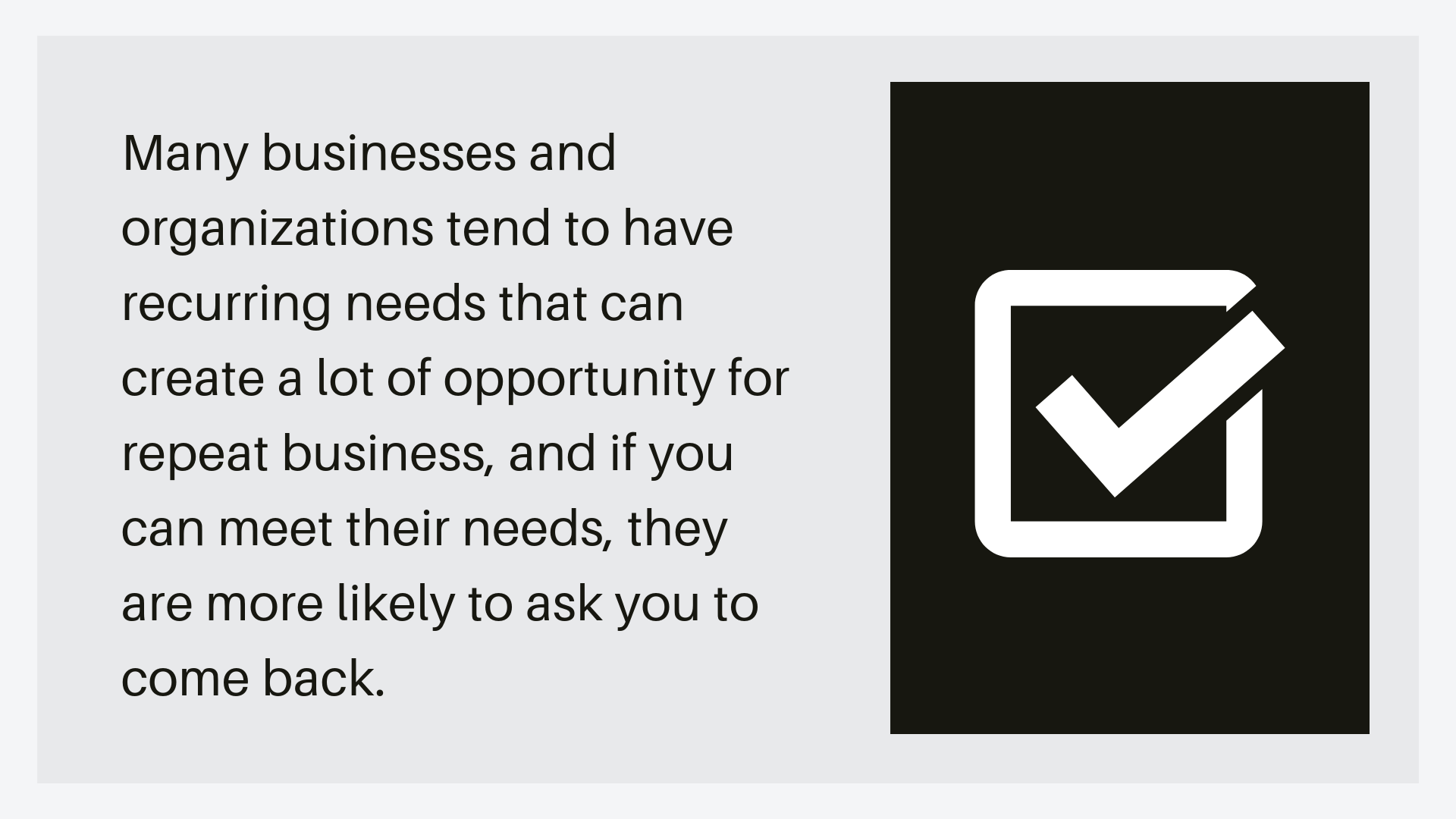
Many businesses and organizations tend to have recurring needs that can create a lot of opportunities for repeat business, and if you can meet their needs, they are more likely to ask you to come back.
However, you need to stay top of mind, and remember that there are a dozen other speakers who they have worked with in the past. Stay in consistent contact, make sure your content is up-to-date, and keep asking.
Wrapping it up
You are not alone as a speaker who is looking to branch out from speaking regionally to the global stage. But if it were easy, everyone would do it.
This being said, while it is challenging, it is certainly not impossible.
It takes persistence, great talks, and the right mindset.
We have mentioned many great articles and podcasts in this article, if you are looking for something to read next (and don’t feel like scrolling up) here is the full list of those mentioned:
Articles:
-
Knowing your audience: the key to adapting your presentation
-
Creating the marketing materials you will need to make an impact online: Videos, Testimonials, SpeakerHub profile, Speaker One Sheet PDF and a Website or landing page on your website
-
We need to talk about the B2B market. It’s a game changer for solopreneur speakers
-
Addressing a multicultural audience | Presenting in Dubai: 6 Tips from an expert speaker
-
Where will a "rock on" sign offend your audience? Plus 9 other gestures to avoid internationally.
Podcasts:
Be searchable on the fastest growing professional network of speakers and event organizers: SpeakerHub. Find out more here.





